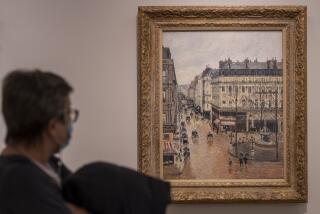New rules proposed for plundered Nazi art
- Share via
VIENNA -- Austria will tighten rules requiring the restitution of art seized during the Nazi period, the government said Wednesday after criticism from the Jewish community.
Culture Minister Claudia Schmied said an exemption for private foundations, which has excluded claims against Vienna’s Leopold Museum, would be reexamined.
“I am seeking a clear regulation of the matter of restitution regarding the Leopold Foundation. The debate of the past few weeks has not enhanced the reputation of the republic and especially not that of the Leopold Foundation,” she said.
She had asked the foundation to agree to a comprehensive survey of the provenance of the museum’s entire collection.
Property belonging to Jews was confiscated during Nazi rule in Germany and neighboring countries.
Debate was revived after Austria’s Jewish community leader Ariel Muzicant said in a television interview in February that the Leopold Museum should be closed down until the law was changed.
The museum, one of Vienna’s major tourist attractions, is classed as a private foundation even though it is state-funded.
In addition, the government will seek the return of works taken between 1933, when Hitler first came to power, and 1945, when Nazi Germany was defeated.
The current law covers from 1938, when Austria was annexed by Nazi Germany, to 1945.
The change in the law would also broaden the definition of property that could be returned and include goods expropriated in all areas of influence of the Nazis’ Third Reich.
Thousands of works have been returned to their original owners or their heirs under the present law. It was unclear how much more property would be covered by the changes announced Wednesday.
Sophie Lillie, an art researcher, said the most significant work at issue is “Haeuser am Meer” (Houses on the Sea) by 20th century Expressionist Egon Schiele. It was seized by the Nazis in 1938 and is claimed by a British family. One report values it at $15 million.
“Any national museum would have given it back long ago,” Lillie said.
Erika Jakubovits, a spokeswoman representing Austrian Jews, welcomed the government’s change of heart.
“This is what we have long wanted and hoped for. . . . The initiative on the Leopold Museum is to be welcomed. We feel a responsibility for all Austrian or former Austrian Jews wherever they may be to help them advance this matter so that art works can be returned,” she said.
More to Read
Sign up for Essential California
The most important California stories and recommendations in your inbox every morning.
You may occasionally receive promotional content from the Los Angeles Times.









